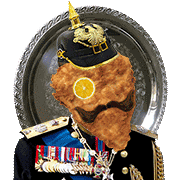|
Grand Fromage posted:Yang Jisheng's work is equally good. But it's not like there's a fundamentally different take or anything. All that stuff happened, it's well documented, plenty of living people remember it. Even the Party eventually admitted it happened during reform and opening in the 80s, though I wouldn't go talking about it today. There's not really a moral position you can arrive at other than disdain for the people who were responsible for tens of millions of deaths. Anything else would be denialism. It's not denialism to say that Frank Dikotter, a leader of the Victims Of Communism foundation which explicitly includes and mourns the Nazis in its count of victims, has a bad faith perspective on the reasons behind certain actions that Mao and co took which is often just "they were so drat evil and didn't want people to be free", and it comes through in his writing. I'm not denying any of the outcomes and I don't have any chapters off the top of my head that I disagree with. I gave the example of Kotkin, who calls Stalin "the despot" every second paragraph, as a historian with a right wing background and perspective who is better able to recognize his own ideology and put his subjects actions in proper context. I haven't read Tombstone yet but I'm also interested in this topic and open to recommendations.
|
|
|
|

|
| # ? May 15, 2024 19:34 |
|
It's been a while since I read the books, but I don''t seem to remember that Dikotter says Mao did what he did because he was "so drat evil and didn't want people to be free". The books tend to make clear that the Great Leap Forward was due to Mao's overoptimistic views of collectivization and his push for rapid industrialization, and that the Cultural Revolution was a way for Mao to deflect criticism against him to groups and individuals that he thought were hostile (and then it took on a life of his own and were encouraged by factions like the "Gang of Four" and their supporters, who wanted to take and hold onto power as Mao got sick. I mean, Mao was pretty drat evil, but he did the stuff he did for a reason, and Dikotter discusses that, even if he spends more attention on the effect that these programs had on the people than the government elite.
|
|
|
|
Shimrra Jamaane posted:It does a good job upending a lot of ahistorical assumptions because it’s very questionable in an academic and research sense and is much more of an ideological polemic than history. There’s a reason why, with only a couple exceptions, the editorial reviews for the book are not from anyone in the field of Anthropology or evolutionary science and the one big name that stands out is James C. Scott who has a lot research in the field but is 85 years old now and has always written with a very open and clear argument in favor of Anarchism. Most every other review is by some publication like the Atlantic, Jacobin, New Statesman, etc. Do you have a link to any thorough/interesting critiques of Dawn of Everything? Reading it I was definitely vacillating between "this is so cool" and "hmm, that seems like a reach", even though I'm broadly sympathetic to the authors' politics.
|
|
|
|
Politics aside, Dikotter is a much better writer than Yang. I put down The World Turned Upside Down because there was hardly any narrative or interesting analysis, it was just a constant rotating list of long named political organizations being formed and disbanded and long lists of names of people being appointed to run said organizations. It's really dull.
|
|
|
|
Chairman Capone posted:One of the craziest things I've seen is a few years ago, when I was in Guatemala, some book store was selling a defense of United Fruit. That was crazy to see. Wish I could remember what it was. that seems like a book where they just put it there so that anyone who tries to buy it just wakes up in the hospital, but wow i'm curious what that would even say . quote:The first bonus episode of Blowback S2 is about the coup in Guatemala which covers some of the United Fruit stuff. Ah, cool, I think I only ever listened to the first season of that, thanks. Epicurius posted:Try Peter Chapman's "Bananas". And I'll check that out too, thanks.
|
|
|
|
Sailor Viy posted:Do you have a link to any thorough/interesting critiques of Dawn of Everything? Reading it I was definitely vacillating between "this is so cool" and "hmm, that seems like a reach", even though I'm broadly sympathetic to the authors' politics. Well I don’t have any specific writings critiquing that book, it is just months old after all. But what in particular stands out in my mind is its very unorthodox descriptions of very early city states such as Ur and other Mesopotamian settlements. This work, like some others, runs head first into a critical flaw where some academic tries to transpose modern concepts of class or caste back to a time way before that would even be understood. The argument then follows that “well back in those days there was far less of a hierarchical societal structure and people lived freer lives.” Which can be true in a literal sense but extremely wrong in a functional sense regarding how these early civilizations saw themselves, their place in the world, and how they were governed. These early cites are often times treated as some blank canvas in that some people use pieces evidence to claim that they were the doom of the free and unrestricted natural being of human existence. And others will claim that they were actually the culmination of a needs based collective organization that was in those more innocent days the peak of societal equality only to later be corrupted. Essentially the main thesis of this book and other works like it is that societal structures that we recognize as civilization are unnaturally imposed on humanity basically as a longview critique against the current capitalist system. Which again is true in a literal sense in that all civilization IS a social construct that we collectively agree to make work. It’s not something dictated by some unfeeling deterministic universe. BUT it brushes aside the very very long, and critically, VARIED development of humanity across the world and ironically imposes far more conscious and borderline conspiratorial explanations on why things happened then actually occurred. It’s a polemic that ironically removes human agency for the large majority while at the same time attributing “unnatural” choice and invented impositions to a smaller group of elites. Which again, is very much transposing one type of modern view of the world way way back. Shimrra Jamaane fucked around with this message at 13:21 on Oct 13, 2022 |
|
|
|
sleep with the vicious posted:It's not denialism to say that Frank Dikotter, a leader of the Victims Of Communism foundation which explicitly includes and mourns the Nazis in its count of victims, has a bad faith perspective on the reasons behind certain actions that Mao and co took which is often just "they were so drat evil and didn't want people to be free", and it comes through in his writing. I'm not denying any of the outcomes and I don't have any chapters off the top of my head that I disagree with. I gave the example of Kotkin, who calls Stalin "the despot" every second paragraph, as a historian with a right wing background and perspective who is better able to recognize his own ideology and put his subjects actions in proper context. Hadn't heard about that, I know nothing about the dude beyond his work. Personally I don't care, not interested in defending everything he's ever said and he wouldn't be the first guy with some lovely political opinions to do good history. But if you do care then just read Yang, it's fine. There aren't any other great recommendations for the topic in English really since nobody else has had access to the sources they did. And nobody will again for the foreseeable future, unfortunately.
|
|
|
|
Grand Fromage posted:Hadn't heard about that, I know nothing about the dude beyond his work. Personally I don't care, not interested in defending everything he's ever said and he wouldn't be the first guy with some lovely political opinions to do good history. But if you do care then just read Yang, it's fine. Fair enough, and I didn't mean to come across like I was attacking you, more that I just wish Dikotters approach was different because it is really disappointing to me that there aren't more in depth books on such an important period of history.
|
|
|
|
sleep with the vicious posted:Fair enough, and I didn't mean to come across like I was attacking you, more that I just wish Dikotters approach was different because it is really disappointing to me that there aren't more in depth books on such an important period of history. I did not get this vibe from Dikotter's books, just to present a countering opinion. They read as pretty straight-forward descriptions of "things that actually happened" with good sourcing on that and "here's what the people involved actually said/did", also sourced well. I really did not detect a baseline "communism is evil, let's work backwards from that into how I'll present these historical records" attitude in any of the three books. I would appreciate, if you wanted to spend the time, you pointing out any evidence of this in the books. I really want that not to come across as a call-out, because it is not, I am open to re-examining my recollection of the books but they're all huge so any specific examples would be welcome. Or if there's a summary article or something out there that covers this that you agree with, I'd take the link.
|
|
|
|
History is in interpretation not a list of "things that actually happened."
|
|
|
|
Minenfeld! posted:History is in interpretation not a list of "things that actually happened." Sigh; fine: he scrupulously defines incidents as happening to the best of the historical record's ability to describe them. I do not have any evidence of him deliberately leaving facts out or misconstruing them. He goes to great lengths to define and explain his sources and their limitations as he perceives them throughout the books.
|
|
|
|
neongrey posted:that seems like a book where they just put it there so that anyone who tries to buy it just wakes up in the hospital, but wow i'm curious what that would even say . I think the gist was just that the coup was all the CIA’s doing and the company had nothing to do with it. Which, talk about a convenient scapegoat….
|
|
|
|
Sailor Viy posted:Do you have a link to any thorough/interesting critiques of Dawn of Everything? Reading it I was definitely vacillating between "this is so cool" and "hmm, that seems like a reach", even though I'm broadly sympathetic to the authors' politics. https://notevenpast.org/a-false-dawn/ I think this is a pretty good concise critique, written by a UT anthropology professor. The core issue he has with the book is summed up in this quote from the review: quote:
For a lengthier critique, a historian at Stanford wrote a 15 page critique that covers a variety of issues he has with the methodology and conclusions of the book: https://www.academia.edu/69494234/R...ory_of_Humanity There's also a number of other critical reviews out there, here's two other critical reviews by three anthropologists: https://mronline.org/2021/12/20/the-dawn-of-everything-gets-human-history-wrong/. Here's another one by a Stanford archaeologist, which is focused on his disagreement with *The Dawn of Everything's* interpretation of archaeological evidence: https://www.journals.uchicago.edu/doi/10.1086/720603 (It's less negative than some of the other ones, and more narrow). There's some others out there too, these are the ones I could find with a quick search.
|
|
|
|
CrypticFox posted:https://notevenpast.org/a-false-dawn/ I think this is a pretty good concise critique, written by a UT anthropology professor. The core issue he has with the book is summed up in this quote from the review: Cheers!
|
|
|
|
Shimrra Jamaane posted:Well I don’t have any specific writings critiquing that book, it is just months old after all. But what in particular stands out in my mind is its very unorthodox descriptions of very early city states such as Ur and other Mesopotamian settlements. This work, like some others, runs head first into a critical flaw where some academic tries to transpose modern concepts of class or caste back to a time way before that would even be understood. The argument then follows that “well back in those days there was far less of a hierarchical societal structure and people lived freer lives.” Which can be true in a literal sense but extremely wrong in a functional sense regarding how these early civilizations saw themselves, their place in the world, and how they were governed. These early cites are often times treated as some blank canvas in that some people use pieces evidence to claim that they were the doom of the free and unrestricted natural being of human existence. And others will claim that they were actually the culmination of a needs based collective organization that was in those more innocent days the peak of societal equality only to later be corrupted. Isn't this pretty much the argument of the book? That society has taken many surprising forms over many millenia, and identifying any clear patterns and projecting them into pre-history is blinkered and usually ideologically motivated? It really sounds like you're actually repeating the message of the book, not criticising it
|
|
|
|
Ras Het posted:Isn't this pretty much the argument of the book? That society has taken many surprising forms over many millenia, and identifying any clear patterns and projecting them into pre-history is blinkered and usually ideologically motivated? It really sounds like you're actually repeating the message of the book, not criticising it Yeah that’s not an unfair take on my post, I’m not very articulate, but I really should emphasize that some things they use as evidence are just incorrect.
|
|
|
|
Yeah even to a complete layman a lot of the evidence in the book looks like "this is what COULD HAVE happened", but it felt like a very conversational sort of book, a comparison of arguments and an expansion of horizons. The general thesis is "human society has been more diverse than we've thought"
|
|
|
|
Yeah that’s my issue. I mean it’s not some abomination to the historical discourse. But it’s closer to a Malcolm Gladwell sort of book that somehow pushed through and got a lot more hype.
|
|
|
|
I'm like halfway through and enjoying it but it is clearly something that should be understood critically.
|
|
|
|
I just finished listening to G.J. Meyer's The Borgias - the Hidden History and it was fun and informative, but may as well been subtitled "it's highly unlikely anything you heard about the Borgias really happened" Next up is J. North Conway's Queen of Thieves.
|
|
|
|
Unfortunately in real life Alexander VI did not get in an epic fist fight with a Florentine assassin.
|
|
|
|
I finished Hobsbawm's The Age of Revolution: Europe 1789-1848 the other day. It may have been the driest book I've ever read but having known nothing about the period I found it very informative. Anybody else get down with it?
|
|
|
|
Yes. It's a good book, as are the rest of the series (although the 20th century volume is probably too close to the material). Obviously it's a Marxist history and has some blind spots, but I really enjoy Hobsbawm.
|
|
|
|
Kull the Conqueror posted:I finished Hobsbawm's The Age of Revolution: Europe 1789-1848 the other day. It may have been the driest book I've ever read but having known nothing about the period I found it very informative. Anybody else get down with it? I didn't find that dry at all, and it was really helpful to me to read a Marxist viewpoint on history. The others in the series are mostly great, the last one or two have a bit of a blind spot around the realities of the Soviet Union, but he was a really brilliant and important historian.
|
|
|
|
Lawman 0 posted:I'm like halfway through and enjoying it but it is clearly something that should be understood critically. 
|
|
|
|
I thought it was pretty moist. If a historian makes amusing references to the novels/movies of the time period, I generally won't find the book dry.
|
|
|
|
Any recommendations for a history of currency that isn't by goldbugs or crypto bros?
|
|
|
|
grassy gnoll posted:Any recommendations for a history of currency that isn't by goldbugs or crypto bros? It's not a universal history of currency, in fact it's very specific, but I would highly recommend The Currency of Socialism: Money and Political Culture in East Germany by Jonathan R. Zatlin. I read it in grad school and it's one of the books that's stuck to mind since.
|
|
|
|
grassy gnoll posted:Any recommendations for a history of currency that isn't by goldbugs or crypto bros? I'm probably a bit too into the weeds for this one, but a couple of recent ones you might find interesting are: The Currency of Politics: The Political Theory of Money from Aristotle to Keynes by Stefan Eich Money and Empire: Charles P. Kindleberger and the Dollar System by Perry Mehring How Global Currencies Work: Past, Present, and Future by Barry Eichengreen, Arnaud Mehl, and Livia Chitu This is not directly about currency, but the best narrative account of US central banking in the 70s, 80s, and early 90s is Confidence Game by Steven Soloman. Similarly not directly what you asked for, but this podcast with Tim Baker goes into the history of the politics of currency in the US from a lefty perspective https://thedigradio.com/podcast/inflation-politics-with-tim-barker/ . There is not a lot of consensus about how this stuff works so be prepared to look at this history from a variety of theoretical / ideological angles. In general, this stuff can be pretty dry, so from a readability perspective I would recommend the Perry Mehring and Steven Soloman books. plogo fucked around with this message at 15:44 on Oct 18, 2022 |
|
|
|
Chairman Capone posted:It's not a universal history of currency, in fact it's very specific, but I would highly recommend The Currency of Socialism: Money and Political Culture in East Germany by Jonathan R. Zatlin. I read it in grad school and it's one of the books that's stuck to mind since. I would also recommend Stuff and Money in the Time of the French Revolution by Rebecca Spang along these lines as a more specific history.
|
|
|
|
Kaiser Schnitzel posted:I didn't find that dry at all, and it was really helpful to me to read a Marxist viewpoint on history. The others in the series are mostly great, the last one or two have a bit of a blind spot around the realities of the Soviet Union, but he was a really brilliant and important historian. Yeah I was probably being a little unfair with the dry comment; the majority of the time, I was captivated by his characterizations of class and ideology. There were occasional specifics that completely glazed my brain, but maybe it's because I have not often read all-encompassing histories like this very much.
|
|
|
|
grassy gnoll posted:Any recommendations for a history of currency that isn't by goldbugs or crypto bros? It’s kind of a tangent to what you’re asking for but I found Debt, the first 5,000 years interesting as it covered the periods and conditions when currency broke down. Should cover some of the gaps and alternatives people used.
|
|
|
|
not sure if this was already brought up but Frank Dikötter has a new book out next month, China After Mao: The Rise of a Superpower. I recently read Wild Swans which ends near Mao's death. although Wild Swans is a personal account and a speed-run through historical events, it was a good summary and I think Frank Dikötter's new book will pair well with it - speaking as someone relatively unread on 20th century Chinese history
|
|
|
|
team overhead smash posted:It’s kind of a tangent to what you’re asking for but I found Debt, the first 5,000 years interesting as it covered the periods and conditions when currency broke down. Should cover some of the gaps and alternatives people used. How accurate is this considered? Much like The Dawn of Everything, I’ve seen a few economists and/or historians saying that Graeber gets a lot wrong in it.
|
|
|
|
Richard J Evans and his book The Pursuit of Power is basically a more detailed and academically updated version of Eric Hobsbawm’s books on the 19th century. I couldn’t recommend it enough. And Richard Evans is a huge fan of Hobsbwam and especially his important role in the evolution of historiography even if he doesn’t agree on some ideological things. Man wrote a giant biography on him.
|
|
|
|
Thanks for the recommendations, y'all. I'm always down for recommendations that are related but not necessarily dead on, and it's one of the reasons I like asking for recs in this thread.
|
|
|
|
Fate Accomplice posted:Next up is J. North Conway's Queen of Thieves. finished this and Isaacson's The Code Breaker. Queen of Thieves was bland and unexciting, and the Code Breaker was dry - the actual events surrounding CRISPR's discovery weren't super dramatic, just a lotta back and forth about who gets credit for what, who submitted which paper when, etc. Important stuff, certainly, but not super gripping. Next up is Richard Rhodes' Energy - a Human History.
|
|
|
|
Shimrra Jamaane posted:Richard J Evans and his book The Pursuit of Power is basically a more detailed and academically updated version of Eric Hobsbawm’s books on the 19th century. I couldn’t recommend it enough. The Pursuit of Power was fantastic and I say that as a big Hobsbawm fan. I dare say the actual writing in Pursuit is better.
|
|
|
|
It would be criminal to mention Richard Evans and not bring up that his mammoth three part magnum opus on the Third Reich remains the definitive historical account for the period. There have definitely been some continued dives into Third Reich research in the decade since the final volume came out that fleshes out details that had been opaque but it still absolutely holds up scholastically. Also the man’s brutal takedown of Brandon Simms’ 2019 biography on Hitler is terrific reading. https://amp.theguardian.com/books/2019/sep/27/hitler-only-the-world-was-enough-and-hitler-a-life-review quote:“Hitler was a socialist,” has become a mantra for the “alt-right” in the US as it seeks to discredit Democratic politicians such as Bernie Sanders and Alexandra Ocasio-Cortez. Dinesh D’Souza’s book The Big Lie: Exposing the Nazi Roots of the American Left expounded this claim at length in 2017, comparing points of the Nazi party’s 1920 programme with policies put forward by modern Democrats. So, anyone who claims to be a socialist is really a Nazi who wants to set the country on the road to totalitarianism, war and genocide. Obamacare is only the start; enslavement and death will be the end. It’s a claim that has spread through the Republican party and has been echoed by Donald Trump Jr. It’s beautiful.
|
|
|
|

|
| # ? May 15, 2024 19:34 |
|
Punkin Spunkin posted:Can definitely recommend all of his stuff, so far i've read Just finished "The Battle for Moscow" other day and it was great. The ineptness of the Werchmant every time is just halarious. At every point they just go with the worse decision. I'm glad they did but never knew just how bad at the invasion they truly were. And how utterly screwed they basically were from the start. Operation Barbarossa and Germany's Defeat in the East is going to be the next one I start
|
|
|





































